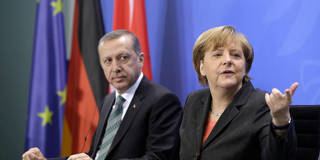A clash of values will almost certainly continue to define relations between Europe and Turkey. But, as has been true for a century, much more – both sides’ fundamental security interests – will be in the balance as well.
BERLIN – Relations between Europe and Turkey have long been characterized by a deep contradiction. Whereas security cooperation (especially during the Cold War) and economic ties have been strong, the vital foundations of democracy – human rights, press freedom, minority rights, and an independent judiciary to enforce the rule of law – have remained weak in Turkey. History, too, has divided the two sides, as the dispute over recognition of the Armenian genocide during World War I attests.
After the ruling Justice and Development Party (AKP) assumed power under Abdullah Gül in 2002 and later under Recep Tayyip Erdoğan, these conflicts seemed to have been resolved. During its first years in government, the AKP wanted Turkey to join the European Union and to modernize the economy. And it delivered real reforms – particularly in areas, such as the judiciary, essential to progress toward EU membership.
But Erdoğan always kept open a “neo-Ottoman” option, which would orient Turkey toward the Middle East and the Muslim world. That became evident in 2007, when German Chancellor Angela Merkel and then-French President Nicolas Sarkozy together de facto closed the door to EU membership for Turkey, and in a manner that humiliated Erdoğan.

BERLIN – Relations between Europe and Turkey have long been characterized by a deep contradiction. Whereas security cooperation (especially during the Cold War) and economic ties have been strong, the vital foundations of democracy – human rights, press freedom, minority rights, and an independent judiciary to enforce the rule of law – have remained weak in Turkey. History, too, has divided the two sides, as the dispute over recognition of the Armenian genocide during World War I attests.
After the ruling Justice and Development Party (AKP) assumed power under Abdullah Gül in 2002 and later under Recep Tayyip Erdoğan, these conflicts seemed to have been resolved. During its first years in government, the AKP wanted Turkey to join the European Union and to modernize the economy. And it delivered real reforms – particularly in areas, such as the judiciary, essential to progress toward EU membership.
But Erdoğan always kept open a “neo-Ottoman” option, which would orient Turkey toward the Middle East and the Muslim world. That became evident in 2007, when German Chancellor Angela Merkel and then-French President Nicolas Sarkozy together de facto closed the door to EU membership for Turkey, and in a manner that humiliated Erdoğan.